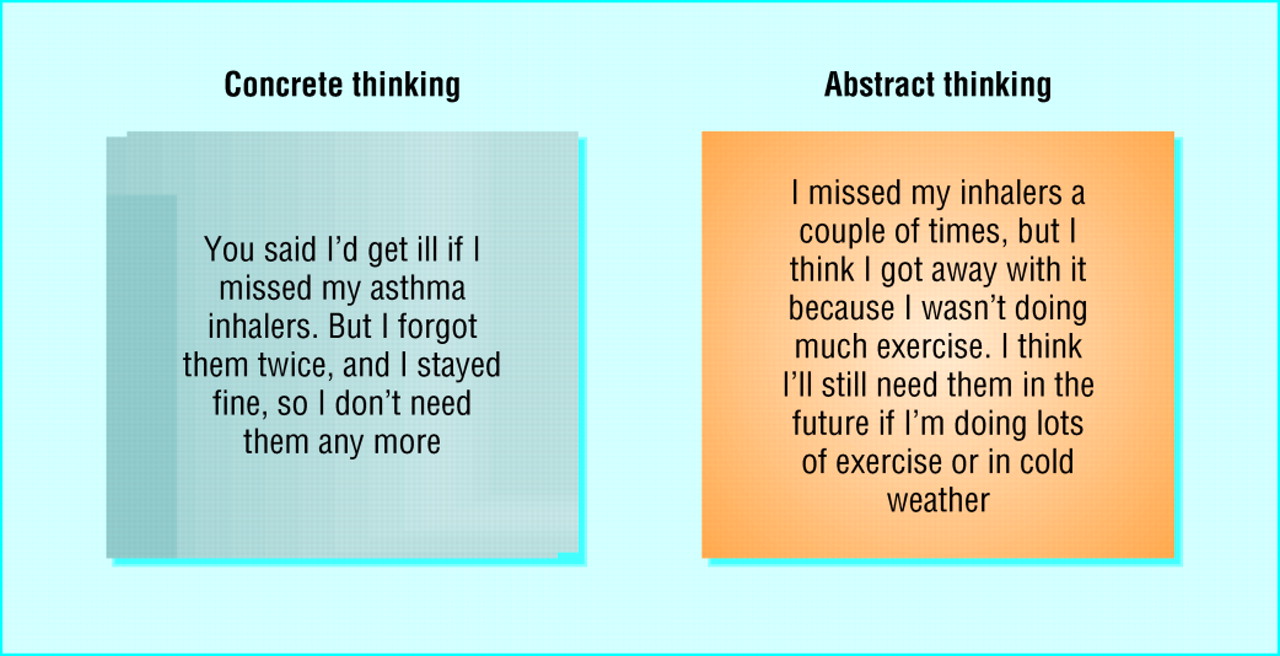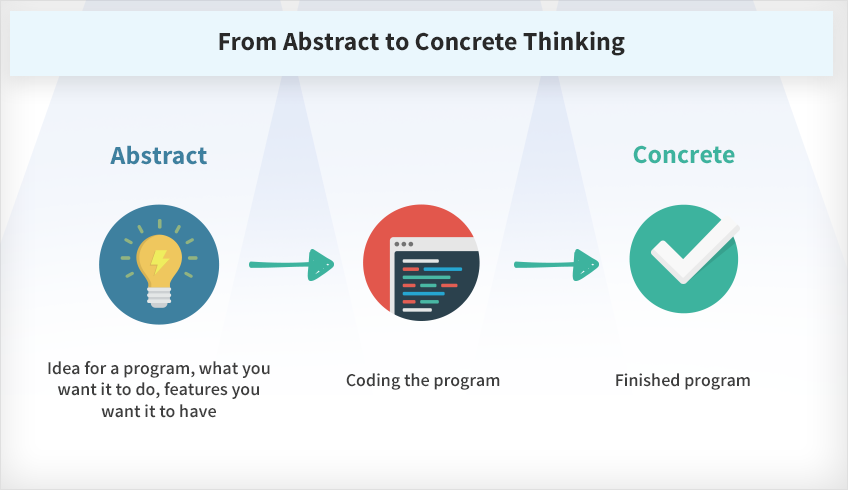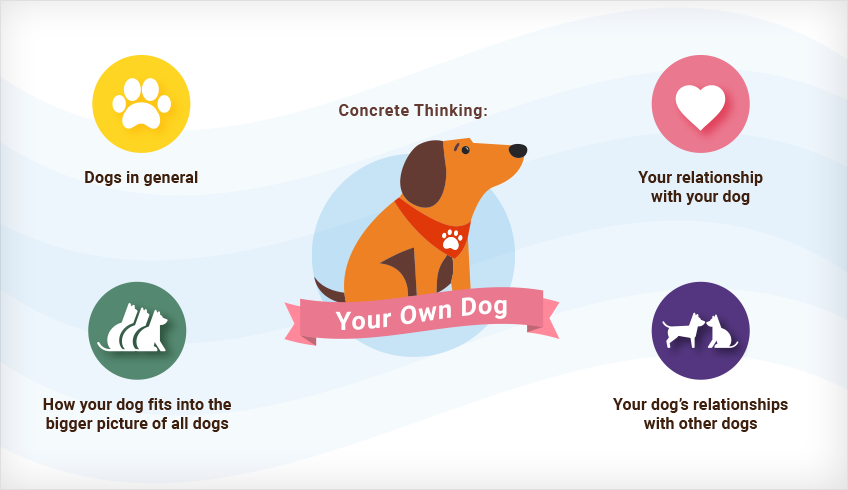What is abstract thinking? This is a question that has puzzled philosophers and thinkers for centuries. In general, it can be described as the ability to think about things abstractly, without getting bogged down by the details. Abstract thinking is important for both personal and professional development. In this article, we will explore what abstract thinking is, and how you can develop it yourself.
Contents
Understanding Abstract Thinking

Thinking
We hear the word “thinking” a lot. We think about what we should wear, what we should eat, and where we should go on vacation. When it comes to making important decisions, though, there’s more to thinking than just mulling over different options. There are different types of thinking and each type serves a different purpose.
Abstract Thinking
One type of thinking is abstract thinking. Abstract thinking is a higher-level cognitive process that allows us to see beyond the concrete, tangible world and understand concepts that are not physically present. It’s what allows us to think about things that we can’t see or touch, like love or justice.
Abstract Reasoning And Intelligence
Abstract thinking is often associated with intelligence. This is because people who are good at abstract reasoning can see beyond the concrete and understand complex concepts.
However, it’s important to note that not all intelligent people are good at abstract reasoning. There are different types of intelligence, and abstract reasoning skills only tap into a certain type of intelligence.
Abstract Reasoning And Creativity
Creativity is another trait that is often associated with abstract thinking. This is because people who are good at abstract reasoning can come up with new ideas and see the world differently.
Again, it’s important to note that not all creative people are good at abstract reasoning. There are different types of creativity, and abstract thinking skills only tap into a certain type of creativity.
Importance of Abstract Thinking
Abstract reasoning is an important cognitive skill. It’s what allows us to see the bigger picture and understand how different concepts are connected. Abstract thinking is also associated with intelligence and creativity.
Abstract reasoning skills are important in both personal and professional life.
- In personal life, they allow us to think about things beyond our everyday experiences and understand complex concepts like morality and spirituality.
- In professional life, abstract thinking skills help us come up with new ideas, solve problems, and see the big picture.
Abstract Thinking vs. Concrete Thinking

Concrete thinking is the process of understanding and responding to information that is directly visible or tangible. It’s what allows us to focus on the here and now and interact with the physical world. Concrete thinkers see things as they are, in black and white. They find it difficult to see beyond the information that is directly in front of them.
On the other hand, abstract thinkers can see the world in multiple dimensions and make connections between different ideas. Abstract thinkers, on the other hand, can see beyond the concrete and tangible. They can understand concepts that are not physically present.
NOTE: While concrete thinking is important for everyday decision-making, abstract thinking is critical for solving problems, coming up with new ideas, and understanding the world around us.
Types of Abstract Thinking
There are three types of abstract thinking:
- Unfolding Abstraction: Unfolding abstraction is the ability to see how a concept can change over time. For example, a child who can understand that a caterpillar will turn into a butterfly has mastered unfolding abstraction.
- Relational Abstraction: Relational abstraction is the ability to see the relationships between different concepts. For example, a student who can understand how the Civil War was caused by a variety of factors has mastered relational abstraction.
- Logical Reasoning: Logical reasoning is the ability to use deductive reasoning to conclude. For example, a student who can solve a math problem by using the principles of algebra has mastered logical reasoning.
Unfolding Abstract Thinking

How Does It Develop
Abstract thinking skills develop gradually over time. They are most developed in early adulthood but continue to develop throughout our lives.
Several things contribute to the development of abstract thinking skills. These include:
- Exposure to new and different experiences
- Engagement in creative activities
- Participation in critical thinking activities
- Exposure to complex ideas and concepts
How To Develop Abstract Thinking
Abstract thinking skills develop over time. They are not something that we are born with.
The first step in developing abstract reasoning skills is learning how to think logically. This involves understanding the principles of deduction and induction.
Once we have mastered the principles of logic, we can move on to developing our ability to see relationships between different concepts. This involves understanding how things are interconnected.
Finally, we need to learn how to think about things in multiple dimensions. This involves being able to see beyond the information that is directly in front of us.
Exercises To Develop Abstract Thinking Skills
There are several exercises that we can do to develop our abstract thinking skills:
- Take a problem and break it down into smaller parts. Then, try to solve the problem by using the principles of deduction or induction.
- Come up with as many different solutions to a problem as possible.
- Try to see the relationships between different concepts. For example, try to understand how the Civil War was caused by a variety of factors.
- Think about things in multiple dimensions. For example, try to think about how a caterpillar will turn into a butterfly.
Practicing Abstract Thinking

In The Classroom
The best way to develop such thinking skills is to practice them in the classroom.
There are several ways that we can do this:
- Have students solve complex math problems.
- Ask students to write essays that argue a position.
- Challenge students to come up with new ideas.
- Encourage students to think critically about the world around them.
In The Workplace
Abstract thinking skills are also important in the workplace.
There are several ways that we can practice such thinking skills in the workplace:
- Think about how we can improve our products or services.
- Come up with new ideas for marketing our products or services.
- Challenge ourselves to find new and innovative solutions to problems.
- Encourage employees to think critically about the work that they are doing.
In The Relationship
Abstract thinking skills can also be useful in relationships.
There are several ways that we can practice such thinking skills in relationships:
- Think about how our actions affect our partners.
- Come up with new and interesting ways to show our love for our partner.
- Challenge ourselves to see things from our partner’s perspective.
- Encourage our partner to think critically about the relationship.
Quoting Philosophers

It has also been discussed by philosophers throughout history.
Here are some quotes from famous philosophers on the subject:
- “All thought is concerned with objects and their relations.” – Gottfried Wilhelm Leibniz
- “I apprehend the universals in things, not by abstraction from particulars but as particulars themselves.” – John Locke
- “The highest and most comprehensive kind of knowledge is that which abstracts from individual objects and comprehends their universal properties.” – George Berkeley
Hearing From Experts

Many experts believe that the ability to think abstractly is a key component of success in life.
Here are some quotes from experts on the subject:
- “The ability to think abstractly is one of the most important skills a person can have.” – Dr. Tony Buzan
- “The capacity for abstraction is the cornerstone upon which scientific thinking and all higher intellectual activity must stand.” – Ernst Mach
Brain Activity During Abstract Thinking

Recent studies have shown that there is increased activity in the prefrontal cortex during abstract thinking. This area of the brain is responsible for higher-level thinking, such as planning and decision making.
Books
If you want to learn more about abstract thinking, there are several books that you can refer to:
- The Power of Intuition by Gary Klein
- Thinking, Fast and Slow by Daniel Kahneman
- Theory of Mind: The Definitive Account of Its Development and Use by Peter Mitchell
Conclusion
Abstract thinking is a complex process that involves several different skills. It is an important skill that we need to develop to be successful in the classroom, workplace, and our relationships. There are several ways that we can practice abstract thinking skills. There are several resources that we can consult to learn more about it. Finally, the best way to develop these skills is to practice them in the real world.
A Word From Therapy Mantra
Your mental health — Your psychological, emotional, and social well-being — has an impact on every aspect of your life. Positive mental health essentially allows you to effectively deal with life’s everyday challenges.
At TherapyMantra, we have a team of therapists who provide affordable online therapy to assist you with issues such as depression, anxiety, stress, workplace Issues, addiction, relationship, OCD, LGBTQ, and PTSD. You can book a free therapy or download our free Android or iOS app.


